- Home
- John le Carré
Absolute Friends Page 4
Absolute Friends Read online
Page 4
But Mundy’s provenance is not as easily defined as these barroom reminiscences suggest. The Major, so lavish with the larger brushstrokes, is reticent when it comes to detail, with the result that Mundy’s memories of his infancy are a succession of camps, barracks, depots and hill stations that accelerates as the Major’s fortunes dwindle. One day the proud son of Empire rules supreme over a whitewashed cantonment complete with red-ochred club, polo, swimming pool, children’s games and Christmas plays, including a historic production of Snow White and the Seven Dwarfs in which he stars as Dopey. The next, he is running barefoot down the mud streets of a half-empty settlement miles from any town, with bullock carts instead of motor cars, a corrugated iron cinema for a club, and Christmas pudding served in a regimental institute green with mold.
Few possessions survive so many moves. The Major’s tiger skins, his military chests and treasured ivory carvings are all posted missing. Even his late wife’s memory has been stolen, her diaries, letters and a box of precious family jewelry: that thieving bastard of a stationmaster at Lahore, the Major will have him flogged, and every one of his rascally chaprassis with him! He makes the vow one night in his cups after Mundy has driven him over the edge with his persistent damn-fool questioning. “Her grave, boy? I’ll tell you where her bloody grave is! Gone! Smashed to bits by rampaging tribesmen! Not a stone left standing! All we’ve got of her is here!” And he drives his tiny fist against his breast, and pours himself another chota peg. “That woman had class you wouldn’t believe, boy. I can see her every time I look at you. Anglo-Irish nobility. Vast estates, razed to the ground in the Troubles. First the Irish, now the bloody Dervishes. Entire clan dead or scattered to the winds.”
They come to rest in the garrison hill town of Murree. While the Major vegetates in a mud-brick barrack hut smoking Craven A for his throat’s sake and growling over pay imprests, sick lists and leave rosters, the boy Mundy is consigned to the care of a very fat Madrasi ayah who came north with independence, and has no name but Ayah, and recites rhymes with him in English and Punjabi, and surreptitiously teaches him holy sayings from the Koran, and tells him of a god called Allah who loves justice and all the peoples of the world and their prophets, even Christians and Hindus, but most of all, she says, he loves children. It is only most unwillingly, after much pressing on Mundy’s part, that she admits to possessing no husband, children, parents, sisters or brothers left alive. “They are all dead now, Edward. They are with Allah, every one. It is all you need to know. Go to sleep.”
Murdered in the great massacres that came of the Partition, she admits under interrogation. Murdered by Hindus. Murdered at railway stations, in mosques and marketplaces.
“How did you stay alive, Ayah?”
“It was the will of God. You are my blessing. Go to sleep now.”
Come evening, to a chorus of goats, jackals, bugles and the insistent twanging of Punjabi drums, the Major will also contemplate mortality, under a neem tree at the river’s edge, puffing at cheroots that he calls Burmas and cuts into lengths with a tin penknife. Intermittently he refreshes himself from a pewter hip flask while his overgrown son splashes with his native peers and, acting out the never-ending tales of adult slaughter all around them, plays Hindus versus Muslims and takes turns at being dead. Forty years on, Mundy has only to close his eyes to feel the magic cooling of the air that comes with sundown, and smell the scents that leap out of the sudden dusk, or watch the dawn rise over foothills glistening green from the monsoon, or hear the catcalls of his playmates give way to the muezzin and the nocturnal bellows of his father berating that damned boy of mine who killed his mother—Well, didn’t you, boy, didn’t you? Come here juldi when I order you, boy! But the boy declines, juldi or otherwise, preferring to let Ayah clutch him to her flank until the drink has done its work.
Now and then, the boy must endure a birthday, and from the moment it appears on his horizon he succumbs to a variety of illnesses: stomach cramps, feverish headaches, Delhi belly, the onset of malaria, or fears that he has been bitten by a poisonous bat. But the day still comes round, the kitchen wallahs prepare a fearsome curry and make a great cake with Many Happy Returns to Edward on it, but no other children are invited, the shutters are closed, the dining table is laid for three, candles are lit and the servants stand silently round the wall while the Major in full mess kit and decorations plays the same Irish ballads on the gramophone again and again, and Mundy wonders how much of his curry he can get away with not eating. Solemnly he blows out his candles, cuts three slices of his birthday cake and lays one on his mother’s plate. If the Major is half sober, father and son will do silent combat with a red-and-white ivory chess set brought out for feast days. The games have no conclusion. They are put aside for tomorrow, and tomorrow never comes.
But there are the other, rarest nights—they never needed to be many—when the Major with a more than usually frightful scowl will stalk to a desk in a corner of the room, unlock it with a key from his chain, and ceremoniously extract from it an elderly red-bound volume called Selected Readings from the Works of Rudyard Kipling. Pulling a pair of reading spectacles from their battered metal case and setting his whiskey glass in a hole in the arm of his rattan chair, he will bark toneless phrases about Mowgli the jungle boy, and another boy called Kim who became a spy in the service of his Queen and Emperor, though what happened to him when he had become one, and whether he won or was caught, were matters not divulged by the extract. For hours on end the Major will sip and read and sip as solemnly as if he is conducting a one-handed service of Communion, until at length he falls asleep, and Ayah emerges silently from the shadows where she has been crouching all this while and, taking Mundy by the hand, leads him to bed. The Kipling anthology, the Major tells him, is the sole survivor of a vast eclectic library that was once his mother’s.
“That woman had more books in her than I’ve had hot dinners,” he marvels in his soldier’s way. Nevertheless, with time it becomes something of a puzzle to Mundy, and a frustration, that such an illustrious reader as his mother should have left him such a ragbag of half-told tales. He prefers Ayah’s bedtime stories of the heroic doings of the Prophet Mohammed.
For the remainder of his education the boy attends the dying remnants of a colonial school for the orphans and children of impecunious British officers, performs in pantomimes and pays weekly visits to a smooth-faced Anglican missionary who instructs him in divinity and piano, and likes best to guide boys’ fingers with his own. But these random spurts of Christianity are only tiresome interruptions in the sunlit passage of each pagan day. His best hours are spent playing ferocious cricket with Ahmed, Omar and Ali on the dust-patch behind the mosque, or gazing in glassy rock pools that flash mother-of-pearl, while he whispers child-love to Rani, a nine-year-old barefoot beauty of the village whom he intends to marry forever just as soon as arrangements can be made; or bawls patriotic hymns in Punjabi as the shiny new flag of the Islamic Republic of Pakistan is hoisted over the regimental cricket pitch.
And Mundy would have passed the rest of his youth in this undemanding manner, and the rest of his life also, had not a night come when the servants and even Ayah are fled and the bungalow’s shutters are once more bolted fast, while father and son in silent haste load their last few life possessions into leather suitcases with brass corners. By first light they are bumping out of camp in the back of an ancient military police truck with two grim Punjabi soldiers riding shotgun. Hunched at Mundy’s side the unfrocked major of Pakistani infantry wears a civilian trilby hat and his old school tie, a regimental tie being no longer pukkah for an outcast found guilty of raising his hand to a brother officer. What he did with his hand when he’d raised it was not defined, but if Mundy’s experience was anything to go by, he didn’t just slip it back in his pocket unfired. At the garrison gates, the dewan who until now welcomed Mundy with a beaming salute is granite-faced, and Ayah stands as white as all the ghosts she fears in her grief, anger and disgust. Ahmed, Omar a
nd Ali howl and wave and scamper after the truck, but Rani is not among them. Dressed in her Brownie tunic, her black hair freshly plaited down her back, she bends double at the roadside, bare feet pressed together as she chokes over her folded arms.
The boat leaves Karachi in darkness and stays dark all the way to England because the Major has become ashamed of his face after seeing it printed in the native press. To hide it from view he takes his whiskey in his cabin, and food only when the boy presses it on him. The boy becomes his father’s minder, keeping watch for him, making sorties, vetting the ship’s daily newspaper in advance for toxic matter, sneaking him on deck for furtive walks before daylight, and in the evenings while the ship changes for dinner. Lying on his back on the other bunk, secondary-smoking his father’s Burmas, counting the brass screw heads in the teak ribs that arch across the bulkhead and listening now to his father’s ramblings, now to the chug of the ship’s engines, or puzzling his unfulfilled way through Rudyard Kipling, he dreams of Rani, and swimming home to what his father still calls India.
And the Major in his anguish has much to say on the subject of his adored, abandoned India, some of it to the young Mundy’s ear surprising. With nothing more to be gained by pretending otherwise, the Major declares himself mortally disgusted by his country’s connivance in the disastrous Partition. He heaps curses on the rogues and idiots in Westminster. Everything is their fault, right down to what they did to Ayah’s family. It is as if the Major must unload his own guilt onto their shoulders. The bloodbaths and forced migrations, the collapse of law, order and a central administration are a consequence not of native intransigence but of British colonial disrespect, manipulation, greed, corruption, cowardice. Lord Mountbatten, the last viceroy, against whom the Major until now will hear no evil, becomes in the fume-soaked atmosphere of their tiny cabin the Jackass. “If the Jackass had moved slower on Partition and faster to stop the massacres, he’d have saved a million lives. Two million.” Attlee and Sir Stafford Cripps fare no better. They called themselves socialists, but they were class snobs like the rest of ’em.
“As for that Winston Churchill, if he’d been allowed to have his way, he’d have been worse than all the other buggers put together. Know why, boy? Know why?”
“No, sir.”
“He thought the Indians were a pack of fuzzy-wuzzies, that’s why. Flog ’em, hang ’em and teach ’em the Bible. Don’t you ever let me hear you say a good word for that man, d’you understand me, boy?”
“Yes, sir.”
“Give me a whiskey.”
The Major’s burst of heresy may have its intellectual limitations, but its effect on the impressionable Mundy at this crucial moment in his life is of lightning. In a single flash he sees Ayah standing with her hands clasped in horror, with all her murdered family lying at her feet. He remembers every filtered, unclear rumor of mass murder followed by mass revenge. So it was the British then—it wasn’t just the Hindus—who were the villains! He relives the jibes that as an English Christian boy he was obliged to suffer at the hands of Ahmed, Omar and Ali. Too late, he thanks them for their moderation. He sees Rani and marvels that she sufficiently overcame her disgust to love him. Ejected from the country he loves, caught in the twilight of puberty, dragged night and day towards a guilty country he has not seen but must now call home, Mundy undergoes his first exposure to the radical reappraisal of colonial history.
The England that awaits the young Mundy is a rain-swept cemetery for the living dead powered by a forty-watt bulb. A gray stone medieval boarding school reeks of disinfectant and is ruled by boy quislings and adult despots. Number Two, The Vale weeps and rots as his father cooks inedible curries and pursues his purposeful slide into degradation. There being no native red-light quarter in Weybridge, he retains the services of a flighty Scottish housekeeper named Mrs. McKechnie who, aged eternally twenty-nine, disdainfully shares his bed and polishes the last of his collection of Indian silver boxes until one by one they mysteriously disappear. But flighty Mrs. McKechnie never strokes Mundy’s cheek the way Ayah did, or tells him heroic stories of Mohammed or chafes his hand between both her own until he falls asleep, or replaces his lost talisman of tiger skin to ward off the terrors of the night.
Sent off to boarding school on the strength of a legacy from a distant aunt and a bursary for the sons of army officers, Mundy is bewildered, then horrified. The Major’s parting words, though well intended, have not prepared him for the impact of his new life. “Always remember your mother’s watching you, boy, and if a chap combs his hair in public, run like hell,” his father urges him huskily as they embrace. On the school train, trying desperately to remember that his mother is watching him, Mundy looks in vain for child beggars clinging to the windows, or station platforms packed with rows of shrouded but unmurdered bodies with their heads covered and their feet poking out, or chaps who comb their hair in public. In place of dung-brown landscapes and blue mountain ranges, he sees only sodden fields and mysterious billboards telling him he is Welcome to the Strong Country.
On arrival at the place of his incarceration, the former white godling and baba-log is summarily reduced to the rank of Untouchable. By the end of his first term he is voted a colonial freak, and thereafter affects a chee-chee accent in order to capitalize on the distinction. To the rage of his fellows he keeps a wary eye for snakes. When he hears the rumbling of the school’s ancient plumbing he dives under his desk, yelling, “Earthquake!” On bath days he equips himself with an old tennis racket for fending off any bats that should fall out of the ceiling, and when the bell tolls for chapel he muses aloud about whether the muezzin is calling him. Dispatched on early-morning runs to quell his libido, he is given to inquiring whether the Dorset crows circling overhead are kites.
The punishments he attracts do not deter him. During evening prep he burbles half-remembered passages of Koranic scripture taught to him by Ayah, and when the bell for lights-out sounds he can be discovered in his dressing gown bowed before a cracked mirror in the dormitory washroom, pulling his face about as he hunts for signs of darkening skin and shading round the eyes that will confirm him in his secret conviction that he is a twelve-annas-in-the-rupee half-caste rather than the inheritor of his aristocratic mother’s dignity. No such luck: he is a Despised One, sentenced to life imprisonment as a snow-white guilty British gentleman of tomorrow’s ruling class.
His one spiritual ally is an outcast like himself: a dignified, ageless, diffident, white-haired refugee in rimless spectacles and a shabby suit who teaches German Extra Studies and cello and lives alone in a redbrick bedsitter on the Bristol Road roundabout. His name is Mr. Mallory. Mundy discovers him reading in a tea shop in the High Street. A grand meeting of masters is currently in progress, so why is Mr. Mallory not attending it?
“Because I’m not completely a master, Mr. Mundy,” he explains, closing his book and sitting bolt upright. “Maybe one day, when I grow up, I become one. But until now, I am a temporary master. Permanently temporary. You wish a piece of cake? I invite you, Mr. Mundy.”
Within the week, Mundy has enrolled for twice-weekly cello lessons, German Extra Studies and German Oral. “I have taken this path because music is all I care about and German is a sort of literary version of music,” he writes recklessly to the Major, in a letter seeking his permission to add fifteen pounds to the annual tuition charges.
The Major’s reply is equally impulsive. It comes by telegram or, as the Major would say, signal. “Your application wholeheartedly approved. Your mother musical genius. If he’s related to the Mallory who took part in assault on Everest he’s prime human material. Ask him and report back. Mundy.”
Mr. Mallory is not, alas, prime human material, or not of the sort the Major has in mind. His real name, he regrets, is Dr. Hugo Mandelbaum, he comes from Leipzig and has no taste for heights. “But don’t tell this to the boys, please, Mr. Mundy. With such a name as Mandelbaum, they have too much fun.” And he laughs and nods his white head with the resigna
tion of one who has been the object of quite a bit of fun already.
The cello is not a success. At first, Dr. Mandelbaum is concerned only with bow action. Unlike the Anglican missionary in Murree he treats Mundy’s fingers as if they were live electric wires, gingerly attaching them to their points before leaping back to safety at the other side of the room. But by the end of their fifth session, his expression has changed from one of technical concern to simple grief for a fellow human being. Perched on his piano stool, he clasps his hands together and leans over them.
“Mr. Mundy, music is not your refuge,” he pronounces at last, with great solemnity. “Maybe later, when you have experienced the emotions that music describes, it will become a refuge for you. But we cannot be sure. So maybe better for now you take refuge in language. To possess another language, Charlemagne tells us, is to possess another soul. German is such a language. Once you have it in your head, you can go there anytime, you can close the door, you have a refuge. You allow me to read you a little poem by Goethe? Sometimes Goethe is very pure. When he was young like you, he was pure. When he was old like me, he became pure again. So I tell you once in German a most beautiful little poem, then I tell you what it means. And next time we meet, you will learn this little poem. So.”
So Dr. Mandelbaum recites the loveliest and shortest poem in the German language, then provides his translation: Over all the mountains is peace . . . but wait, soon you too will be at rest. And the cello goes back into Dr. Mandelbaum’s cupboard where he keeps his shabby suit. And Mundy, who has learned to hate the cello and is not used to tears, weeps and weeps at the shame of seeing it go, while Dr. Mandelbaum sits on the far side of the room at the lace-curtained window, staring into a book of spiky Gothic lettering.

 The Honorable Schoolboy
The Honorable Schoolboy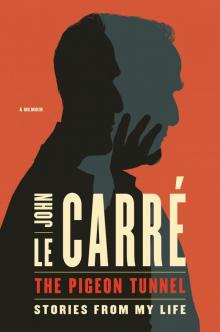 The Pigeon Tunnel: Stories From My Life
The Pigeon Tunnel: Stories From My Life Single & Single
Single & Single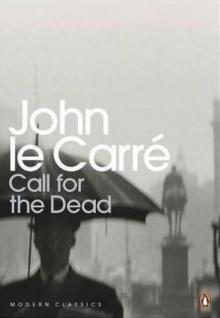 The Spy Who Came in From the Cold
The Spy Who Came in From the Cold The Looking Glass War
The Looking Glass War The Night Manager
The Night Manager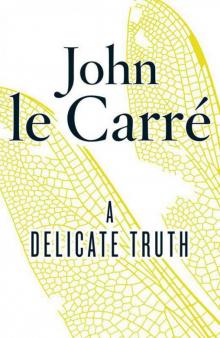 A Delicate Truth
A Delicate Truth A Perfect Spy
A Perfect Spy The Little Drummer Girl
The Little Drummer Girl Absolute Friends
Absolute Friends A Murder of Quality AND Call for the Dead
A Murder of Quality AND Call for the Dead The Russia House
The Russia House The Tailor of Panama
The Tailor of Panama Tinker, Tailor, Soldier, Spy
Tinker, Tailor, Soldier, Spy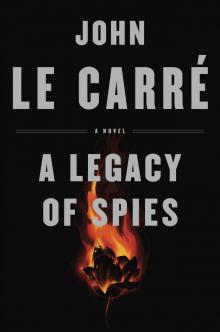 A Legacy of Spies
A Legacy of Spies The Mission Song
The Mission Song A Most Wanted Man
A Most Wanted Man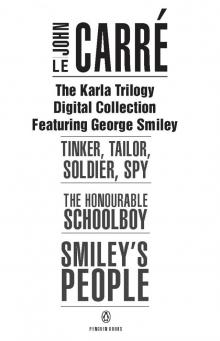 John Le Carré: Three Complete Novels
John Le Carré: Three Complete Novels The Secret Pilgrim
The Secret Pilgrim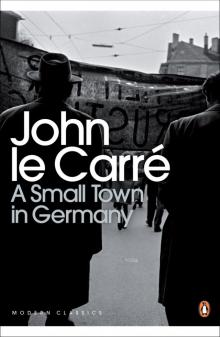 A Small Town in Germany
A Small Town in Germany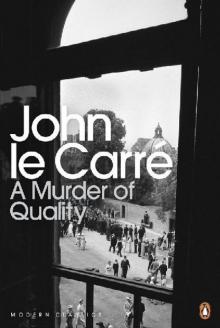 A Murder of Quality
A Murder of Quality Smiley's People
Smiley's People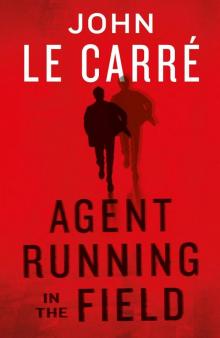 Agent Running in the Field
Agent Running in the Field The Spy Who Came in from the Cold s-3
The Spy Who Came in from the Cold s-3 The Pigeon Tunnel
The Pigeon Tunnel The Russia House - 13
The Russia House - 13 The Honourable Schoolboy
The Honourable Schoolboy Call For The Dead s-1
Call For The Dead s-1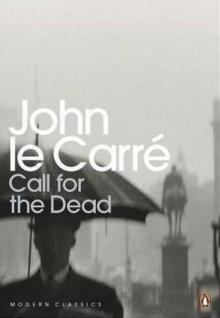 Call for the Dead
Call for the Dead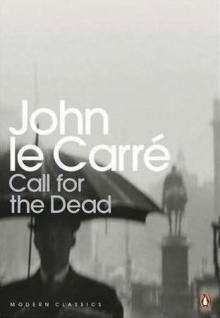 Call for the Dead - 1
Call for the Dead - 1